It’s a familiar story with a different lilt. Street fighting in South London has led many aspiring boxers to local gyms, dissuading them from a life of mischief or criminality. Areas like Brixton, Battersea or Camberwell have been slapped with the reputation of troubled youths and knife crime, however not everyone subscribes to that narrative.
The capital has a plethora of thriving amateur boxing gyms which have birthed talents such as Anthony Joshua, George Groves and James DeGale. Many take their first steps through the doors of their clubs at a young age, from ten to fourteen most commonly. Others, though, stagger through their teens, meeting boxing along the way, sometimes as a matter of consequence.
Teaming up with his entrepreneurial older brother, unbeaten prodigy Denzel Bentley (9-0, 8KOs) started running his own fight club, trying to capitalise on the emptiness of the competitive, misguided youths that occupied tower blocks in his area.
“I’m from South London, between Battersea and Vauxhall. To be honest, my brother bought a boxing set from the market one time. He bought it and he was always trying to be this mastermind business guy, always trying to make money from things. He was trying to charge people to fight each other with the boxing gloves, but from where we’re from, no-one was really trying to pay or nothing – so we just ended up fighting each other.
“Me and my brother, we ended up fighting other people inside our blocks and stuff, people from our area or whoever. We were sorta’ beating everyone up, then people started saying, ‘You guys should maybe take this serious – you’re kinda good!’ We had natural reflexes and stuff, but we weren’t actually any good, it was just ‘cos nobody else was boxing.”
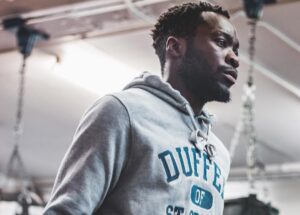
He continued, describing his entry into the sport with amateur schooling, “We went to college and I found a friend that was doing boxing in my second year. He took me down to a boxing club. I went to Fisher ABC down in Bermondsey, I was about seventeen or eighteen and that was my first amateur club. We went there for a bit, on-and-off, but when I really got stuck into it I had my first amateur fight when I was nineteen and we moved on from there.”
After years of sitting ringside at small hall events, I’d come to expect that most bouts would come to an administrative conclusion, with judges separating both fighters. On a sixteen-fight card, you’d maybe see three or four stoppages amongst learning fights and steady tests. Bentley had made a name for himself, stopping eight of his nine opponents, including the extremely durable former Cameroonian defectee, Serge Ambombo.
A knockout ratio of 88% had certainly caught the eye. Who was the quiet assassin dubbed ‘2 Sharp’? More to the point, where had he been hiding? His time studying the sweet science in Bermondsey’s Fisher ABC had been well-spent, but hadn’t yielded confidence in the power he now displays.
“As an amateur, I had seventeen fights and I only stopped three people. So, I didn’t think I had power like that. Obviously in sparring, someone would say they’ve never been hit so hard, but I never really took to that because I wasn’t really stopping anyone.Then, when I turned pro I thought, ‘Okay, we’ll probably win on points’. When I’m in the gym, I work on boxing. I’m working on little tricks, counter-punching, how to set people up and all of these little things.
“As I’ve turned professional, obviously the training is quite different from the amateurs and I think that’s what’s kinda helped me settle down and pick my shots. I guess I have a little bit of power – but I think it’s the accuracy as well. I didn’t expect to have this power, so as I’m knocking these people out, I’m not getting carried away with it! I’m working on boxing and fitness. The power is a bonus!”
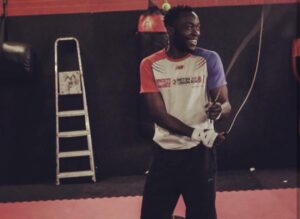
I was talking to Denzel only a couple of days removed from his latest stoppage victory in the historic Royal Albert Hall. After signing a promotional deal with Frank Warren, he’d been added to the card and looked devastating, despite not featuring on the televised portion of the show. Stalking his opponent and springing forward aggressively like a cobra, the Battersea man again proved himself a talking point.
Escaping the trappings of the smaller venues and ticket selling was to be celebrated, with added exposure and opportunities sure to come his way under the banner of BT Sports and Queensberry Promotions. Bentley is handled by Martin Bowers, manager of explosive heavyweight Daniel Dubois. The middleweight contender opened up on his deal with Warren, thankful for being in the right place at the right time.
“Martin has a good relationship with Frank [Warren] anyway. There’s two fighters in our stable who are already with Frank: James Branch and Daniel Dubois. I hoped that if I just kept impressing that I would get there, which obviously I have. I think what made the process faster was that I fought on his dinner show with about two or three hours notice. That’s the show that I stopped Serge Ambombo on and I think he was really impressed.
“When my manager approached him about signing me, he thought, ‘I have seen him’ and that kinda helped the transition. I didn’t have a chat with him beforehand. My manager sorted everything out, but I spoke to him after my last fight. He didn’t really get to see it because they were doing an interview and I was fighting in the background and he said, ‘Just keep doing what you’re doing!’ He’s gonna get me out as soon as possible and he said he’s been impressed so far.”
Frank wasn’t the only one who’d been impressed. I’d caught up with fans in attendance who raved about Denzel, excited by his punishing style and determined approach to stopping his opponents. That’s what builds a fanbase. Not patient, sparring sessions before the sun sets. He had a grounded understanding of his profile, detailing its growth over the last year.
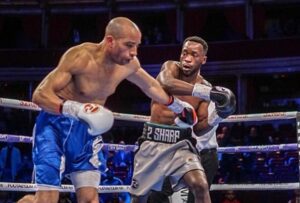
“Yeah, it’s going round [my name]. It’s kinda floating around right now, especially all over Twitter, all over social media. Everyone’s kinda [interested], I dunno, my performances are standing out, I guess! It’s been a bit odd. It took a while of checking my page and stuff, seeing that there are people who are actually interested in my journey and they start following me on social media, saying my name, tagging me in things. It’s a bit unusual at first, but I think I’m now getting used to it.”
He continued, “I keep myself to myself. I mean, around my friends, I’m the loudest person in the world. But to the outside public, I don’t like to be loud around these people I’m not comfortable with. I just keep myself to myself. I don’t do things to show off, so it’s all a bit odd. I’m getting used to it, but I’m not fully used to it and I know that my name is gonna keep growing the more that I do well.”
Aged twenty-four, he was at the start of a promising journey in a division containing plenty of tempting fights. One such contest was a proposed bout with Luton’s Linus Udofia (13-0, 7KOs). Udofia, now the mandatory for the English middleweight title, was left without an opponent when he was due to challenge for the Southern Area title in December. The man who’d jumped in against Ambombo and destroyed him on two hours notice, was happy to oblige.
The fight never materialised, with the more experienced Udofia being granted his English title eliminator opposite Darren Cordona which he won in dominant fashion, concluding in a seventh round stoppage. The respect between both Bentley and Udofia was admirable in a sport so often dragged through the gutter. That fight would be kept on ice, for now.
“That [talk] was all because he had a title fight and his opponent pulled out. I thought, ‘I would jump in!’ I’m training for a fight already, we can try and get it on the show that I’ve already just boxed on, but his manager [Steve Goodwin] had different plans which I fully understand. It’s a game. Everybody wants to play their part in it, everybody wants to make their money.”
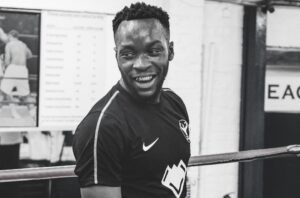
“I was up to fight him, but it’s nothing against him, I’ve met him a few times. I ain’t gonna say that I know him, but he’s a cool guy. I’m not picking on him just to try and find a rival. He was fighting for a title and I said I would step in and fight for that title. All I want this year is some kind of title around my waist. If not, I’m knocking the doors of those who have them. As I’ve been saying, no-one’s career is promised.”
Bentley added, “I just thought, okay we can do it now, let’s take it and then we can do it again down the line. After everyone has seen the first one, the second one would build itself up to be a great fight if it was exciting the first time around. It was just a fight. It is what it is. If we end up meeting down the line, we meet down the line – I’m game. I’m up for fighting anyone. I’m not on this ‘let’s build it, think about the business’. I’m trying to build a CV or a resume. I wanna pull the strings and build it.”
As he approaches double figures as a professional, Denzel took time to reflect on his biggest decision. Despite fighting in the blocks of Battersea, he’d always been capable and intelligent. Infact, it was at University that he decided to promise himself to boxing.
Studying sports science, he was destined for a career assisting with sport, as opposed to directly participating. He revealed that he had decided to drop out after only two amateur bouts, a huge gamble for a young man without titles or major tournament experience.
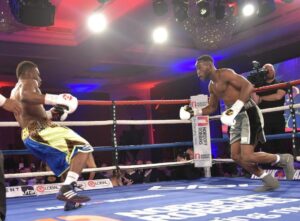
Perhaps, everything was written. Bentley hunts those titles this year, with one eye on British champion Liam Williams – never one to shy away from a risk. He was realistic enough to know he couldn’t rely on those early nights, but told me that boxing is a game of chance, something he’d always embraced.
“I had my first amateur fight when I was nineteen, but I started Uni before that. So, after my second amateur fight, I just thought, ‘I don’t want anything to do with this – I just want to box’. So I just dropped out and put all of my time into it and luckily it paid off (laughs).
“I said to one of my friends, ‘Man, I don’t wanna be here’ and he was saying, ‘Nah, we gotta finish [this course]’. I knew if I dropped out, I would have so much time on my hands and I could put 110% into boxing. If I don’t do it, then I’m a failure. He said, ‘That’s a big risk!’ but I done it… It was lucky!
“I can always go back to Uni as long as I have my UCAS points, Uni ain’t going anywhere. What I can’t go back to is boxing. If I get too old, I can’t go back to boxing and you’re past that age where you can have an effect on the sport. That was my mindset – and nobody knows that, that’s an exclusive!”
Article by: Craig Scott
Follow Craig on Twitter at: @craigscott209